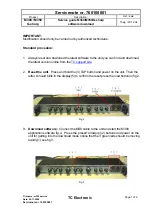
User’s Manual
IBM PowerPC 750GX and 750GL RISC Microprocessor
PowerPC 750GX Overview
Page 56 of 377
gx_01.fm.(1.2)
March 27,2006
The TAU is controlled through the privileged mtspr and mfspr instructions to the four SPRs provided for
configuring and controlling the sensor control logic. The SPRs function as follows.
• THRM1 and THRM2 provide the ability to compare the junction temperature against two user-provided
thresholds. Having dual thresholds gives the thermal-management software finer control of the junction
temperature. In single-threshold mode, the thermal sensor output is compared to only one threshold in
either THRM1 or THRM2.
• THRM3 is used to enable the TAU and to control the comparator output sample time. The thermal-man-
agement logic manages the thermal-management interrupt generation and time multiplexed comparisons
in the dual-threshold mode, as well as other control functions.
• THRM4 is used to improve accuracy in determining the actual junction temperature.
Instruction-cache throttling provides control of the 750GX’s overall junction temperature by determining the
interval at which instructions are fetched. This feature is accessed through the ICTC register. Chapter 10,
Power and Thermal Management, on page 335 provides information about power-saving and thermal-
management modes for the 750GX.
1.12 Performance Monitor
The 750GX incorporates a performance-monitor facility that system designers can use to help bring up,
debug, and optimize software performance. The performance monitor counts events during execution of
code, which relate to dispatch, execution, completion, and memory accesses.
The performance monitor incorporates several registers that can be read and written to by supervisor-level
software. User-level versions of these registers provide read-only access for user-level applications. These
registers are described in Section 1.4, PowerPC Registers and Programming Model, on page 42. Perfor-
mance-Monitor Control Registers, MMCR0 or MMCR1, can be used to specify which events are to be
counted and the conditions for which a performance-monitoring interrupt is taken. Additionally, the Sampled
Instruction Address Register, SIA (USIA), holds the address of the first instruction to complete after the
counter overflowed.
Attempting to write to a user-read-only Performance-Monitor Register causes a program exception, regard-
less of the MSR[PR] setting. When a performance-monitoring interrupt occurs, program execution continues
from vector offset 0x00F00.
Chapter 11, Performance Monitor and System Related Features, on page 349 describes the operation of the
performance-monitor diagnostic tool incorporated in the 750GX.
















































